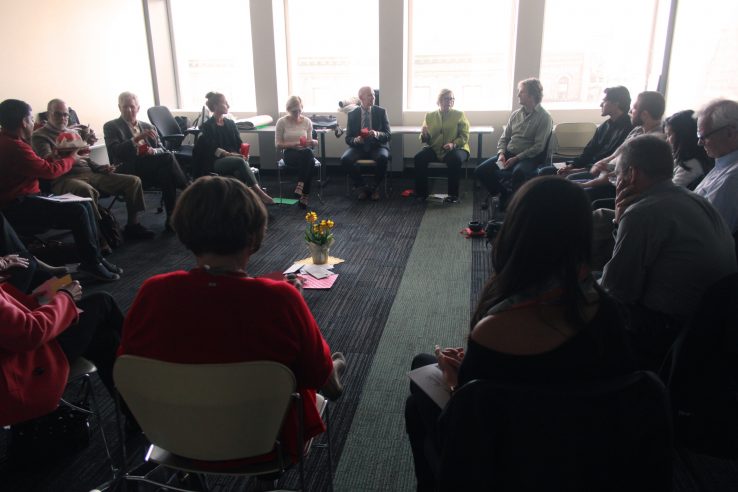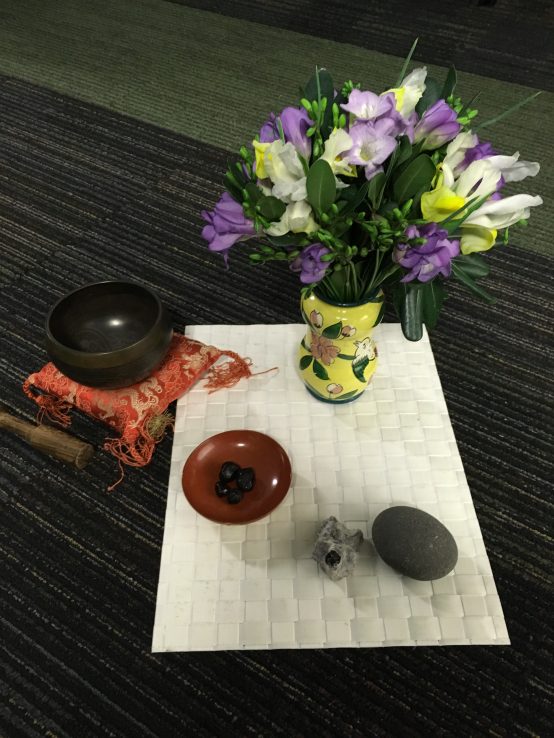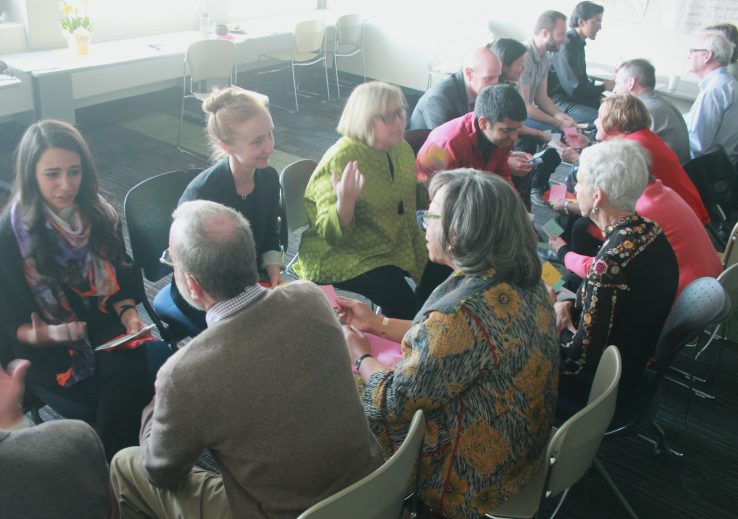Leadership in health care is required in today’s transformative and rapidly changing health system. Regardless of whether one is a clinician, manager, informatics specialist, policy advisor or researcher, being able to effectively lead and encourage system change as well as innovation is a top priority. Our health system is a complex, changing world, and health professionals need to be able to go beyond traditional mindsets and diversify their approaches to change, a task that still poses many challenges for today’s health system leaders.

Wendy Nelson is an alumna of the Master’s of Health Science in Health Administration (MHSc) program at IHPME. For over thirty years she has held senior leadership roles in healthcare and has been both a leader and active participant in transformation initiatives in the public and private sectors – in primary care, hospitals, and community health. In the early stages of her career, Nelson found that many change initiatives that appeared to be quite successful initially, were not sustained over time. “What is the difference between successful and sustainable change, and change that is not sustained or even “fails” to gain traction? It was this question in particular that inspired me to return to school in my late career and pursue a second master’s degree with a focus on international health leadership,” said Nelson.
In her studies, she began to confirm some of her experience and discover new knowledge about change and transformation in complex systems, like health care. In her work as a health care leader, Nelson had noticed that large scale transformation in systems of care, organizations, and teams was complex and often unpredictable. She began to research, as part of her master’s program, what distinguished successful, sustainable transformation from change initiatives that didn’t work or didn’t “stick.” In her research, she identified one key success factor that seemed to distinguish success from failure – the use of deep, authentic communication among all leaders within a system, often in the form of dialogue.
Nelson found that deeper forms of communication, like dialogue, were critical in creating shared meaning within a system and creating a path forward to a desired future. Looking for ways in which she could bring this type of learning and her research back into the field of health care leadership, Nelson crafted the idea of a dialogue series between emerging and experienced leaders in health care with a goal to focus on new forms of leadership that are able to effectively support change and transformation in our complex health care system.
With the support of IHPME, Nelson began planning for a learning project that would come to be known as Vernissage Health, a reinterpretation of the 18th century salon, but with a focus on contemporary leadership development. “As an alumni of the University of Toronto and IHPME, I could think of no better place to hold these dialogue sessions and help health care leaders of tomorrow become better versed in the role they can play in spearheading and supporting positive change,” said Nelson.
IHPME’s Director at the time, Adalsteinn Brown agreed, “It was easy to support Vernissage Health as it connected two of our most valuable resources – our alumni and our students.” Ready to move forward, Nelson partnered with the Dalla Lana School of Public Health’s Professor Blake Poland, who teaches a course on generative dialogue, and has expertise in hosting dialogue, a skill critical to the Vernissage project.
Poland sees dialogue as a means of enabling leaders to move beyond the common mindset of finding a fast “fix-it” solution to problems. Using generative dialogue unleashes the collective wisdom of a group in ways that exceed the capacity of any one individual. Often, the results of participating in generative dialogue are transformative, for participants and for the system of care within which they work. “There is a habit in health care, of trying to produce a “recipe for change” that is driven into a system – that doesn’t always produce the best results,” said Poland. “Change can be quite emotional and take unexpected turns, so the use of dialogue as a tool helps these leaders engage with and recognize the many people who are within a complex system of care. As a result, leaders have a better sense of person and system wholeness when they approach and support change.”
The collaboration between Nelson and Poland led to the emergence of a dialogue series offered to IHPME students in 2017. The sessions were held once a month from January through April, during which the students, from different program backgrounds – management, research, and informatics, gathered to engage in dialogue with experienced leaders. Recruited to the project by Nelson, the experienced leaders were diverse in their backgrounds as well – CEOs and senior executives from across the health system including acute care and rehabilitation hospitals, the private sector, home services, health integration networks, and community and mental health services. With such talent and diversity, they represented a variety of experiences and perspectives about leadership and approaches to leading or supporting change and transformation in the health system.
Each session incorporated a formal circle dialogue setting with the intention of demarcating space and time as different from the usual everyday communication found in routine business or clinical meetings. The setting was created to embody wholeness, encourage mindfulness and authenticity, which allowed participants to listen deeply to one another and to speak from the heart about leadership in health care. “Blake and I had a shared vision of how we wanted the sessions to feel with an intention to make the space a positive, supportive and authentic environment which invited and compelled participants to connect deeply within themselves and with one another,” said Nelson. “Using symbols, rituals, and specific dialogic procedures,” continued Poland, “distinguished our space from the usual meeting environment they are familiar with and disrupted the usual power dynamics in health care by making everyone an equal.”

For the emerging leaders participating in these sessions, the goal was to help them to reflect deeply on their own views about leadership and approaches to change; to listen and learn from experienced leaders about past experiences; and to share and receive support for the often deeply personal challenges facing emerging leaders in today’s environment. “This is a unique and deep form of learning and mentorship, where emerging leaders spend four sessions of two hours each, listening, sharing and reflecting on their own beliefs and practices about leadership. But we end each evening informally over a shared meal. This allows everyone to have an informal conversation and network.” said Nelson. Nelson is also grateful for project sponsor, Associated Medical Services (AMS) for their generous financial support of these networking dinners, which were a critical component of the series.
Turning learning and insights into personal action was one of the final steps in the Vernissage Health experience. Prior to the last session, emerging leaders reflected on key learnings and insights from the experience, writing a personal letter to their “future selves.” These sealed and securely stored letters will be mailed to emerging leaders in six months as a gentle reminder of lessons they may take upon their leadership journey, a practice that was effectively received. “The exercise of writing a letter to my future self was like looking into a crystal ball and seeing the person that I’d hoped to be some day,” said emerging leader Craig Thompson, now Executive Director of Patient Ombudsman. “It knitted together my ideas about personal values, professional integrity and leadership style, into a manifestation of myself that I could relate to and learn from. Through that process, I realized I was actually getting to know my authentic self, which has helped me to be a better person to the people around me and a better leader within my organization.”
Following the last session, participants completed an anonymous survey and were asked to evaluate and provide feedback on the dialogue series. With a 90% participation rate, the series was given a 93% approval rating by emerging leaders, and 100% felt the initiative met its aims and were very satisfied with the structure, format and conditions of all sessions.

Some constructive advice was provided for future series’, including offering a more fulsome orientation session for students regarding the theoretical underpinnings between leadership, leading change and dialogue. As well, many recommended adding a fifth dialogue session to deepen the conversation and more formally focus on how leaders might bring this learning experience into their work within health organizations or the community. ”This response shows there is a significant demand for a new type of learning experience about leadership, and a thirst to learn from and make personal connections with experienced leaders,” said Nelson.
With the success of the first Vernissage Health series documented in a formal evaluation, it has been renewed for another year and will re-launch in January of 2018. Vernissage Health will double in size to two groups, expanding to include graduate students in Public Health Sciences, including the Public Health and Preventive Medicine Residency program, as well as graduate students in IHPME. One group will focus on leadership and leading change in organizations and the health system, while the second group will focus on leadership and leading change in the community and society at large. Experienced leaders will be recruited from public health, NGOs, and include social movement activists to augment this new focus.
“With the rising tidal wave of ecological and social issues, we need to tap into our collective wisdom,” said Poland. Adds Nelson, “Vernissage Health can be the catalyst to unleash the leadership potential in everyone and help harness this energy for positive change.”
For more information about Vernissage Health, contact Wendy Nelson, IHPME Adjunct Professor, Founder and IHPME Project Lead at wnelson@rogers.com
Related News

Sign up for IHPME Connect.
Keep up to date with IHPME’s News & Research, Events & Program, Recognition, e-newsletter.
Subscribe to Connect Newsletter
Get in Contact
Communications
Marielle Boutin
Email Address: ihpme.communications@utoronto.ca





